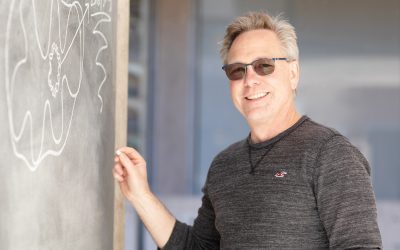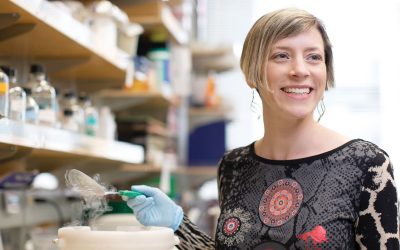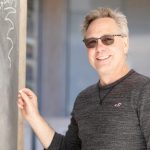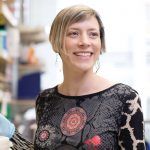Table of Contents

Gerald Shadel explores stressed-out mitochondria
Inside Salk sat down with Shadel to find out how he became interested in mitochondria, what he is driven by scientifically and what he has learned about aging along the way.

The science of aging
What we know about longevity so far: Minimizing smoking, obesity and overeating while maximizing exercise and social interactions seem to correspond to longer and healthier lives, but not always. While many factors have been touted as panaceas for extending life–everything from adhering to a Mediterranean diet to regularly imbibing red wine–a “fountain of youth” has remained stubbornly elusive.

Lillian Eichner: Reading the clues to fight cancer
Eichner began studying cancer while pursuing her PhD at McGill University in Montreal. She was drawn to the Salk Institute for her postdoctoral studies because Reuben Shaw, director of the Salk Cancer Center and a professor in Salk’s Molecular and Cell Biology Laboratory, has taken a new approach to cancer by studying the metabolic pathways of deadly tumors.
From the President
Discoveries
Spotlight
Events
Featured Stories
 Gerald Shadel explores stressed-out mitochondriaInside Salk sat down with Shadel to find out how he became interested in mitochondria, what he is driven by scientifically and what he has learned about aging along the way.
Gerald Shadel explores stressed-out mitochondriaInside Salk sat down with Shadel to find out how he became interested in mitochondria, what he is driven by scientifically and what he has learned about aging along the way. The science of agingWhat we know about longevity so far: Minimizing smoking, obesity and overeating while maximizing exercise and social interactions seem to correspond to longer and healthier lives, but not always. While many factors have been touted as panaceas for extending life–everything from adhering to a Mediterranean diet to regularly imbibing red wine–a “fountain of youth” has remained stubbornly elusive.
The science of agingWhat we know about longevity so far: Minimizing smoking, obesity and overeating while maximizing exercise and social interactions seem to correspond to longer and healthier lives, but not always. While many factors have been touted as panaceas for extending life–everything from adhering to a Mediterranean diet to regularly imbibing red wine–a “fountain of youth” has remained stubbornly elusive. Lillian Eichner: Reading the clues to fight cancerEichner began studying cancer while pursuing her PhD at McGill University in Montreal. She was drawn to the Salk Institute for her postdoctoral studies because Reuben Shaw, director of the Salk Cancer Center and a professor in Salk’s Molecular and Cell Biology Laboratory, has taken a new approach to cancer by studying the metabolic pathways of deadly tumors.
Lillian Eichner: Reading the clues to fight cancerEichner began studying cancer while pursuing her PhD at McGill University in Montreal. She was drawn to the Salk Institute for her postdoctoral studies because Reuben Shaw, director of the Salk Cancer Center and a professor in Salk’s Molecular and Cell Biology Laboratory, has taken a new approach to cancer by studying the metabolic pathways of deadly tumors.
Support a legacy where cures begin.
Scientific discovery at the Salk Institute is made possible through your annual contributions. Your support will accelerate the pace of breakthroughs in understanding disease and pave the way to new drug therapies.
Get involved





















































